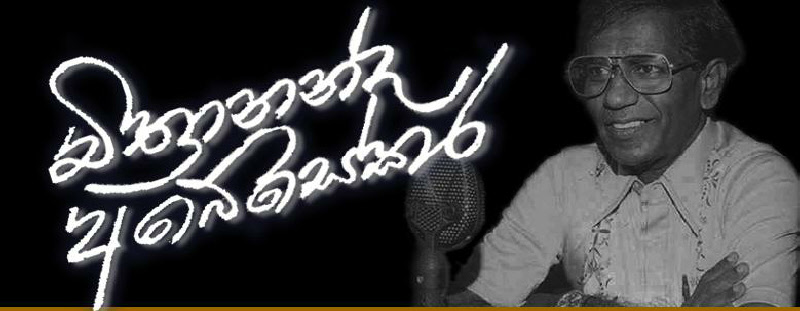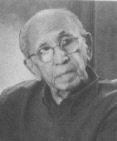

Lester James Peries has the distinction of being the only Sri Lankan filmmaker who has not had one, but four of his films screened at the Mecca of World Cinema – the Cannes Film Festival.



Dr. Lester James Peries -
By Kumar de Silva
For a man who would have either been a newspaper journalist in London, or a Catholic priest in Colombo, LJP found his equilibrium in the cinema and modestly acknowledges the vast national and international honours that rest on his slight frame.
His journey began in 1956 with Rekawa (The Line of Destiny), his first feature which
was strangely a “commercial failure in Ceylon”, yet made it to the Mecca of world
cinema - France’s Cannes Film Festival, the following year. Ever since then there
have been films, more films and yet more films bearing the Lester James Peries stamp
and dealing with a variety of themes.
He had left a comfortable job in London and
took to film making in Ceylon. With his keen eye for visual frames, his sensitive
handling of actors, and the detail paid to his scripts, Lester James Peries was to
change the course of the Sinhala cinema and (rather unintentionally) put in on the
world cinema map.
Rightly called the Father of Modern Sinhala Cinema, he paved the
way for a whole new generation of avant-garde film directors who similarly broke
away from the stereotyped formula films and experimented with new forms and genres.
Lester is possibly the only Sri Lankan filmmaker whose films have been to not one,
but three Cannes festivals. He is also the only Sri Lankan filmmaker who has been
honoured by several countries including top honours from France and India. The venerated
Cinematheque Francaise in Paris has even classified his 1972 film Nidhanaya (The
Treasure) as “one of the classics of world cinema”.
He modestly prefers to wax eloquent
on what the Sri Lankan cinema has done to him, rather than the other way around.
“I
was firmly planted in London. It was the camera that lured me back to Ceylon, virtually
bringing me back from a self-imposed exile. It brought me, an anglicized Roman Catholic,
closer to the land of my birth and its people, and gave me a sense of identity. For
this I am thankful”.
“On the contrary what I regret most is the fact that many of
the master negatives of my work have disintegrated. This has wiped out a lifetime’s
work. And this is something I have been fighting for since the time of Rekawa in
1957 – for the establishment of a proper Sri Lankan film archives. Martin Scorcese
once said, “If I had to choose between making films and saving them, I’d rather be
saving them. And that’s exactly the way I feel”, he says.
Lester James Peries has
the distinction of being the only Sri Lankan filmmaker who has not had one, but four
of his films screened at the Mecca of World Cinema – the Cannes Film Festival. It
began with his first film ‘Rekawa’ (The Line of Destiny. 1957), followed by ‘Beddegama’
(The Village in the Jungle. 1981) and ‘Kaliyugaya’ (The Age of Kali. 1982).
2003
(This year’s) Cannes Festival held (last month) in the south of France, screened
LJP’s ‘Wekande Walauwwa’ (The Manson by the Lake) out of competition as a special
tribute to his lasting contribution to Asian and World Cinema.
LJP revels in dealing with and treating family themes on the large screen. He combines
simple and complex relationships, nuances of feeling, varying degrees of expression,
social undercurrents, the family as a microcosm of the larger world outside etc,
to produce a work of art like no other. In fact he has been doing so for nearly half
a century.
‘Wekande Walauwwa’, his latest, is inspired by Chekov’s Cherry Orchard,
thought totally reconceived and reconstructed in a Sri Lankan milieu. Set in the
late 1980s against a backdrop of insurgency and radicalism, it deals with a Sinhala
Buddhist Walauwwe family.
Mrs. Rajakaruna (Malini Fonseka) comes rushing back from
England with her teenaged daughter (Paboda Sandeepani) to save her mansion from the
bank. She enlists the help of the (now wealthy entrepreneur) son (Ravindra Randeniya)
of a former family retainer. He suggests breaking down the walauwwe and selling blocks
of the large estate to raise the money. Haunted by the drowning of her little son
many years (due to her supposed negligence), and clinging to her class and caste,
she abandons the thought of demolition.
The entrepreneur has parallel designs of
owning the walauwwe, and finally succeeds. In the closing scenes of the film LJP
captures the bulldozing of the walauwwe and the agony in Mrs Rajakaruna’s eyes with
great finesse.
‘Wekande Walauwwe’ had run into rave reviews in the French press such
as ‘Le Monde’ and the respected cinema journal ‘Cahiers du Cinema’. It has been hailed
as yet another masterpiece by LJP in the great tradition of ‘Gamperaliya’.
Rekawa (The Line of Destiny) - 1956
Sandeshaya - 1960
Gamperaliya (Changes in the
Village) - 1964
Delovak Athara (Between Two Worlds) - 1966
Ransalu 1967
Golu Hadawatha (Silence of the Heart) - 1968
Akkara Paha (Five Acres)
- 1969
Nidhanaya (The Treasure) - 1970
Desa Nisa 1972
The God King (The God King) -
1975
Madol Duwa 1976
Ahasin Polowata (White Flowers for the Dead) - 1978
Veera Puran
Appu 1979
Pinhamy 1979
Baddegama (The Village in the Jungle) - 1980
Kaliyugaya (The
Age of Kali) - 1982
Yuganthaya 1983
Awaragira 1995
Wekande Walauwwa (Mansion by the
Lake) - 2001
Ammawarune (Mother) - 2005
Movies Directed by Dr. Lester James Peries


